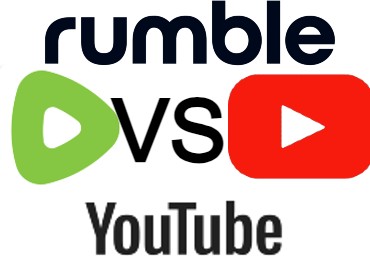Contents
- 1 Exploring the features and functionality of Rumble: Is Rumble a search engine?
- 2 Rumble’s approach to privacy: Is it a more secure search engine?
- 3 Rumble vs. Google: Which search engine delivers more accurate results?
- 4 Rumble as an alternative to mainstream search engines: Is it worth switching?
- 5 Who is on Rumble?
- 6 What is Rumble?
- 7 The Role of Alternative Social Media in the News and Information Environment
Exploring the features and functionality of Rumble: Is Rumble a search engine?
Is Rumble A Search Engine? Rumble is not a traditional search engine like Google or Bing, but it does offer many similar features and functionalities. Rumble describes itself as a discovery engine for online videos, allowing users to search for and explore video content from all over the web. It has an expansive database of videos from various platforms, including YouTube, Vimeo, and Dailymotion. Users can search for specific topics, keywords, or even particular video creators. Rumble also offers advanced filters and sorting options, allowing users to narrow down their search results based on criteria like video length, upload date, and video quality.

Rumble provides personalized recommendations based on a user’s viewing history and preferences, enhancing the overall user experience. While Rumble specializes in video content, it also provides search results for other media formats like images and audio files. Although it may not be as widely known as traditional search engines, Rumble offers a unique and convenient way to discover and explore online videos. Whether you’re looking for educational tutorials, entertainment clips, or viral videos, Rumble is a valuable tool for finding and enjoying video content from across the internet.
Exclusive National Prayer Coin
Get Your National Prayer Coin Now! CLICK HERE
Rumble’s approach to privacy: Is it a more secure search engine?
Rumble is a search engine that prides itself on its approach to privacy and security. It claims to be a more secure search engine compared to its competitors like Google. One of its main features is that it does not collect personally identifiable information (PII) or create user profiles. This means that Rumble does not track or store any of its users’ search history, IP addresses, or any other personal data. By not collecting PII, Rumble aims to provide a safer search experience and protect the privacy of its users. Additionally, Rumble implements strong encryption and uses secure HTTPS connections to ensure that user information remains secure during transmission. Rumble also avoids personalized search results and targeted advertising, further enhancing privacy.
While Google and other search engines often rely on user data for ad targeting, Rumble takes a different approach by not monetizing user data or showing personalized ads. However, it is important to note that no search engine can guarantee complete privacy or security. Rumble may have a more privacy-centric approach, but users should still keep in mind that their data can be exposed through other means, such as their internet service provider or other websites they visit. Overall, Rumble’s focus on privacy and its commitment to not collecting user data makes it a potentially more secure option for those concerned about their online privacy.
Rumble vs. Google: Which search engine delivers more accurate results?
When it comes to comparing search engines, Rumble and Google both have their own strengths and weaknesses. While Google is undeniably the dominant player in the search engine market, Rumble is gaining popularity for its unique approach to delivering search results. When it comes to the accuracy of search results, it is difficult to determine which search engine is superior. Google’s vast index and sophisticated algorithms enable it to provide highly relevant results across a wide range of topics. Its personalized search results also make it particularly adept at understanding user preferences.
On the other hand, Rumble takes a different approach by focusing on delivering unbiased and unfiltered search results. Rumble prides itself on championing free speech and avoiding censorship, which may appeal to those who value transparency and independence. However, this emphasis on unbiased results may result in occasional inaccuracies or less refined search results compared to Google. Ultimately, the choice between Rumble and Google depends on individual preferences and priorities. If accuracy and a comprehensive index are paramount, Google may be the preferred choice. However, for those who value freedom of information and a commitment to free speech, Rumble may offer a refreshing alternative.

Rumble as an alternative to mainstream search engines: Is it worth switching?
Yes, Rumble is a search engine, but it is not a general-purpose search engine like Google. Rumble is known for its focus on video content, particularly user-generated and short-form videos. It aims to provide a platform for creators to upload, share, and discover video content.
Rumble’s search functionality allows users to find videos and other multimedia content on its platform. It competes with other video-sharing and search platforms, such as YouTube and Vimeo. However, it may not have the same level of popularity or breadth of content as some of the larger and more established search engines and video-sharing platforms.
Rumble offers opportunities for content creators to earn money through their videos. This can be done through revenue sharing from ads displayed on videos or by licensing their content to other media outlets. Google also offers monetization options for content creators on YouTube.
Who is on Rumble?
Rumble may have a different content focus or target audience compared to YouTube. Some creators may prefer Rumble for its specific features, policies, or monetization options, while others may choose YouTube or other platforms depending on their content and goals. One common misconception is that Rumble is exclusively a platform for the right-wing audience. This perception arises from the platform’s positioning as one that values free speech and expression. Such an approach has naturally attracted content creators and audiences who may feel marginalized or stifled on more mainstream platforms with stricter content policies. However, this perception overlooks a growing reality – Rumble is evolving.
Recently young talent has joined Rumble, such as Kai Cenat and IShowSpeed created a live show called “The Kai ‘N Speed show” which was exclusive to Rumble. This show was an immediate success and even caused server overload problems during their first streams. Although it was a limited show, it was viewed by millions.
Adin Ross, and Jidion are also taking the platform by storm and these youthful and innovative creators are not confined by political labels but are instead focused on delivering engaging, entertaining, and informative content. Their presence on Rumble is not only redefining the platform but also challenging the notion that it caters exclusively to a right-wing audience. Young talent brings fresh perspectives, diverse interests, and a broader appeal to the platform.
What is Rumble?
Rumble is a video search engine and multi media video platform that focuses primarily on video content. It was created as an alternative to mainstream video-sharing platforms like YouTube and Vimeo. Rumble allows users to upload, share, and discover various types of video content, and it has gained attention for its approach to free speech and content monetization.
Rumble’s journey illustrates the dynamic nature of social media. Platforms, just like any other online communities, evolve over time. Rumble’s initial reputation may have been associated with right-leaning content, but it is clearly diversifying. As it grows in popularity and attracts a wider audience, it’s broadening its content offerings and appealing to a more diverse user base.
Rumble’s video-sharing platform that emphasizes free speech, provides opportunities for content creators to monetize their work, and hosts a diverse range of video content. It has gained attention for its approach to content policies and has attracted users and creators from various backgrounds and interests.
The Role of Alternative Social Media in the News and Information Environment
In today’s digital age, the way we consume news and information has evolved drastically. Traditional media outlets no longer hold a monopoly on news dissemination, thanks to the rise of alternative social media platforms. One platform that has made waves in this evolving landscape is Rumble, which, though initially known for its video-sharing features, is increasingly gaining recognition as a search engine for news and information.
In the not-so-distant past, people relied heavily on established news organizations to provide them with the latest updates and information. The flow of information was largely controlled and regulated by a handful of media giants. However, the advent of the internet and the subsequent rise of social media platforms have fundamentally transformed this landscape.
Enter the era of alternative social media. Platforms like Rumble have disrupted the traditional news ecosystem by democratizing the dissemination of news and information.
Here’s how they’ve done it:
Diverse Voices and Perspectives: Rumble, in particular, has embraced a commitment to free speech and expression. This has attracted a diverse range of content creators who are unafraid to express their viewpoints, even if they diverge from mainstream narratives. This diversity of voices has enriched the information ecosystem, offering alternative perspectives that might not have found a place in traditional media.
The Rise of Citizen Journalism:
Alternative social media platforms have empowered ordinary citizens to become citizen journalists. With the ability to easily share videos, images, and firsthand accounts of events, individuals can now contribute to news coverage in real-time. This ground-up approach to reporting has been particularly evident during major events and protests worldwide.
The Search Engine Functionality:
Beyond its role as a video-sharing platform, Rumble is increasingly being recognized as a search engine for news and information. Users can search for specific topics, events, or keywords and discover a wealth of content related to their queries. This search functionality allows Rumble to function as a hub for news discovery and information retrieval.
Content Monetization:
Rumble’s monetization features have also played a role in shaping the news and information environment. Content creators have the opportunity to earn income from their videos, which can incentivize the production of informative and engaging content.
Exclusive National Prayer Coin
Get Your National Prayer Coin Now! CLICK HERE




One thought on “Rumble: New-Era Social Media Digital Search Engine”